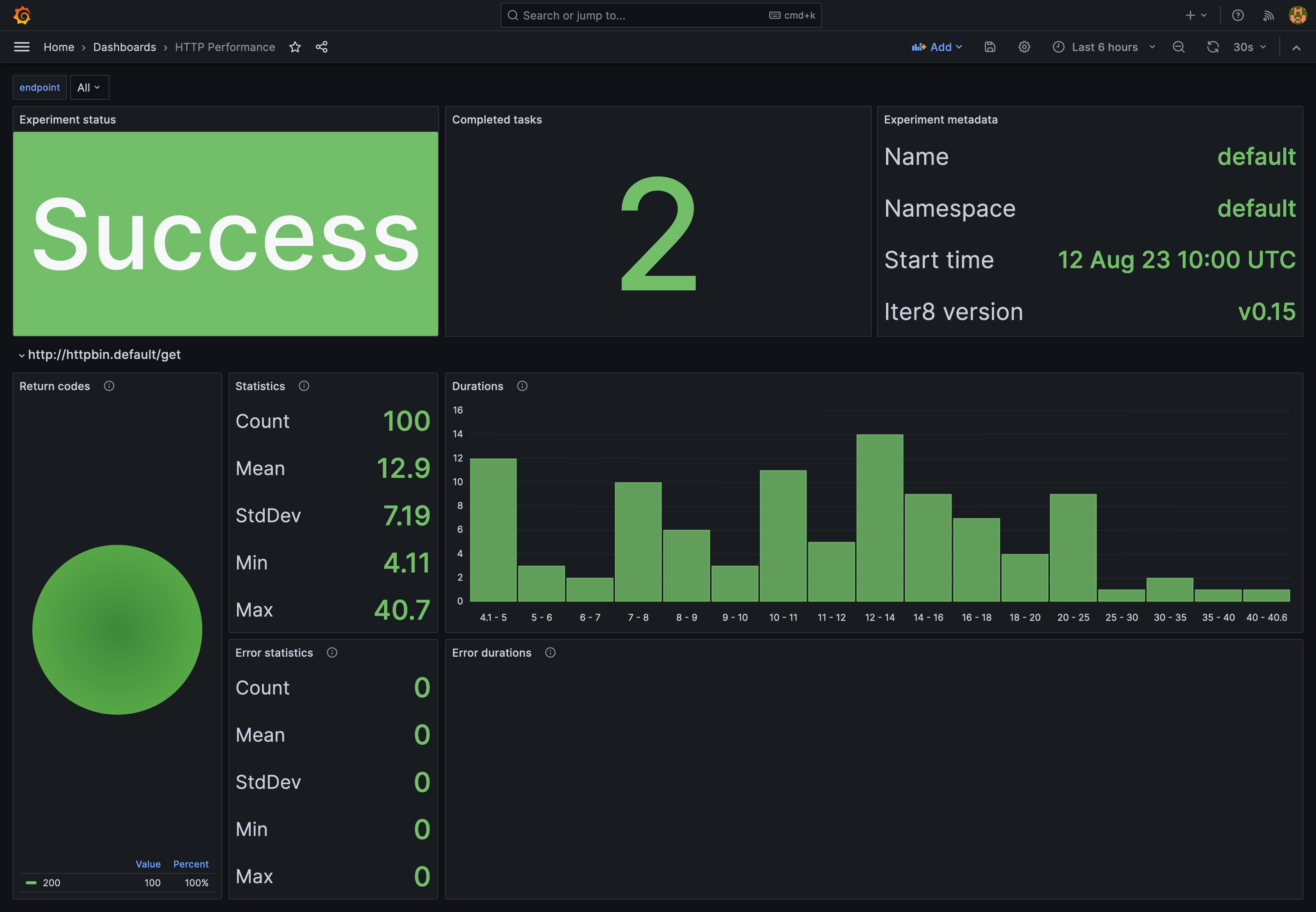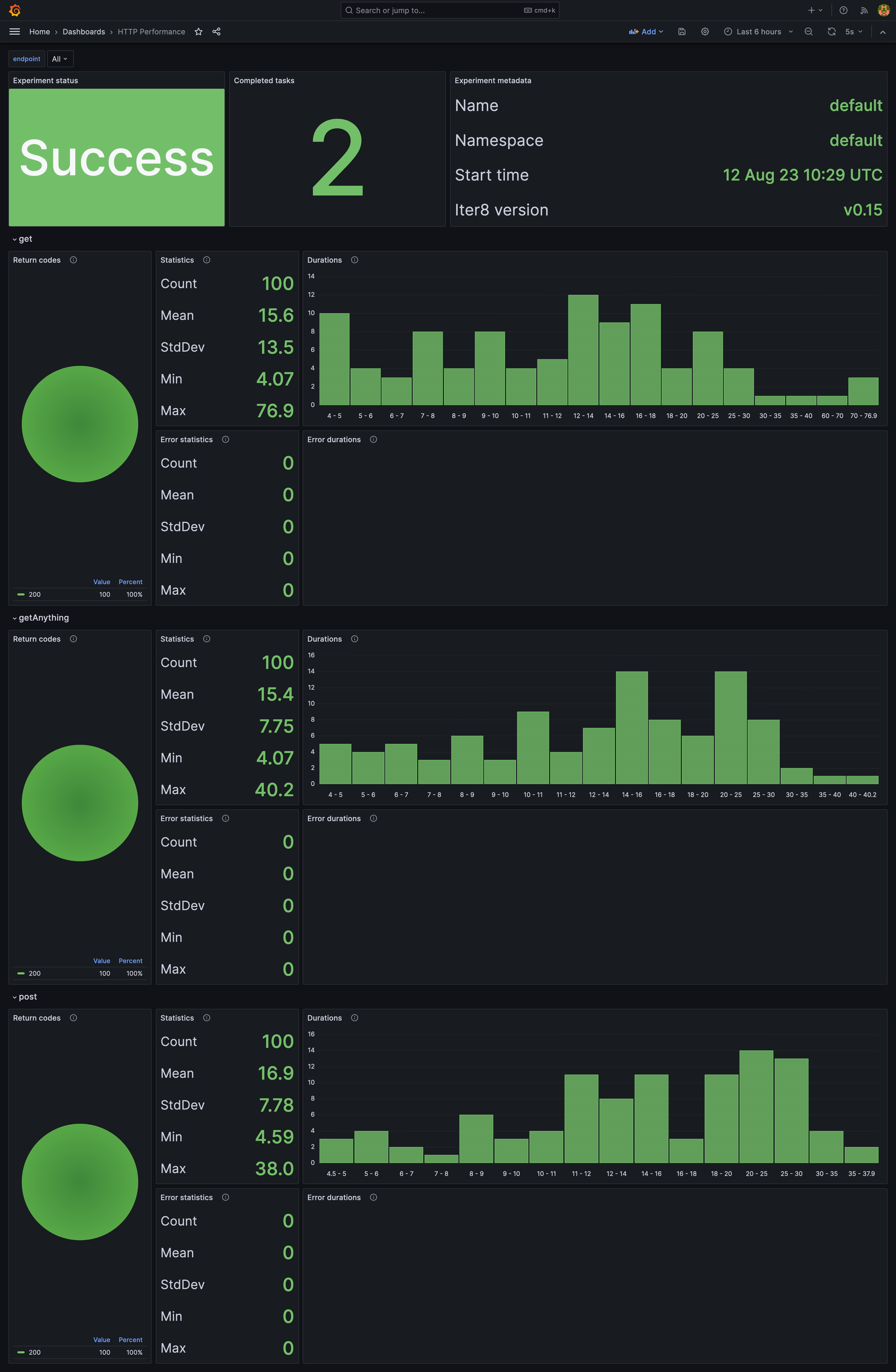http¶
Generate requests for an HTTP service and and collect latency and error-related metrics.
Usage example¶
In this performance test, the http task generates requests for https://httpbin.org/get, and collects latency and error-related metrics. Metrics collected by this task are viewable with a Grafana dashboard.
Single endpoint:
helm upgrade --install \
--repo https://iter8-tools.github.io/iter8 --version 1.1 httpbin-test iter8 \
--set "tasks={http}" \
--set http.url=https://httpbin.org/get
Multiple endpoints:
helm upgrade --install \
--repo https://iter8-tools.github.io/iter8 --version 1.1 httpbin-test iter8 \
--set "tasks={http}" \
--set http.endpoints.get.url=http://httpbin.default/get \
--set http.endpoints.getAnything.url=http://httpbin.default/anything \
--set http.endpoints.post.url=http://httpbin.default/post \
--set http.endpoints.post.payloadStr=hello
Parameters¶
| Name | Type | Description |
|---|---|---|
| url | string (URL) | URL where requests are sent. |
| headers | map[string]string | HTTP headers to use in the requests. |
| numRequests | int | Number of requests to be sent to the app. Default value is 100. |
| duration | string | Duration of this task. Specified in the Go duration string format (example, 5s). If both duration and numRequests are specified, then duration is ignored. |
| qps | float | qps stands for queries-per-second. Number of requests per second sent to the app. Default value is 8.0. |
| connections | int | Number of parallel connections used to send requests. Default value is 4. |
| payloadURL | string (URL) | URL from which to download the content that will be used as the request payload. If this field is specified, Iter8 will send HTTP POST requests to the app using this content as the payload. |
| payloadStr | string | String data to be used as the request payload. If this field is specified, Iter8 will send HTTP POST requests to the app using this string as the payload. |
| contentType | string | Content type of the payload. This is intended to be used in conjunction with one of the payload* fields. If this field is specified, Iter8 will send HTTP POST requests to the app using this as the Content-Type header value. |
| warmupNumRequests | int | Number of requests to be sent in a warmup task (results are ignored). |
| warmupDuration | string | Duration of warmup task (results are ignored). Specified in the Go duration string format (example, 5s). If both warmupDuration and warmupNumRequests are specified, then warmupDuration is ignored. |
| endpoints | map[string]EndPoint | Used to specify multiple endpoints and their configuration. The string is the name of the endpoint and the EndPoint struct includes all the parameters described above. Load testing and metric collection will be conducted separately for each endpoint. |
Precedence¶
Some parameters have a default value, which can be overwritten. In addition, with the endpoints parameter, you can test multiple endpoints and configure parameters for each of those endpoint. In these cases, the priority order is the default value, the value set at the base level, and the value set at the endpoint value.
In the following example, all three endpoints will use the default qps (queries-per-second) of 8.
helm upgrade --install \
--repo https://iter8-tools.github.io/iter8 --version 1.1 httpbin-test iter8 \
--set "tasks={http}" \
--set http.endpoints.get.url=http://httpbin.default/get \
--set http.endpoints.getAnything.url=http://httpbin.default/anything \
--set http.endpoints.post.url=http://httpbin.default/post \
--set http.endpoints.post.payloadStr=hello
In the following example, the get and getAnything endpoints will use the default qps of 8 and the post endpoint will use a qps of 15.
helm upgrade --install \
--repo https://iter8-tools.github.io/iter8 --version 1.1 httpbin-test iter8 \
--set "tasks={http}" \
--set http.endpoints.get.url=http://httpbin.default/get \
--set http.endpoints.getAnything.url=http://httpbin.default/anything \
--set http.endpoints.post.url=http://httpbin.default/post \
--set http.endpoints.post.payloadStr=hello \
--set http.endpoints.post.qps=15
In the following example, all three endpoints will use a qps (queries-per-second) of 10.
helm upgrade --install \
--repo https://iter8-tools.github.io/iter8 --version 1.1 httpbin-test iter8 \
--set "tasks={http}" \
--set http.qps=10 \
--set http.endpoints.get.url=http://httpbin.default/get \
--set http.endpoints.getAnything.url=http://httpbin.default/anything \
--set http.endpoints.post.url=http://httpbin.default/post \
--set http.endpoints.post.payloadStr=hello
In the following example, the get and getAnything endpoints will use a qps of 10 and the post endpoint will use a qps of 15.
helm upgrade --install \
--repo https://iter8-tools.github.io/iter8 --version 1.1 httpbin-test iter8 \
--set "tasks={http}" \
--set http.qps=10 \
--set http.endpoints.get.url=http://httpbin.default/get \
--set http.endpoints.getAnything.url=http://httpbin.default/anything \
--set http.endpoints.post.url=http://httpbin.default/post \
--set http.endpoints.post.payloadStr=hello \
--set http.endpoints.post.qps=15
Further more, set parameters will trickle down to the endpoints.
helm upgrade --install \
--repo https://iter8-tools.github.io/iter8 --version 1.1 httpbin-test iter8 \
--set "tasks={http}" \
--set http.numRequests=50 \
--set http.endpoints.get.url=http://httpbin.default/get \
--set http.endpoints.getAnything.url=http://httpbin.default/anything \
--set http.endpoints.post.url=http://httpbin.default/post \
--set http.endpoints.post.payloadStr=hello
In this example, all three endpoints will have a numRequests of 50.
Grafana dashboard¶
The results of the http task is visualized using the http Iter8 Grafana dashboard. The dashboard can be found here.
Assuming the URL to the Grafana service is $GRAFANA_URL, you can install the dashboard as follows:
- Open Grafana in a browser.
- Add a new data JSON API data source with the following parameters
- URL:
$GRAFANA_URL/httpDashboard - Query string:
namespace=<namespace>&test=<test name>
- URL:
- Import the
httpIter8 Grafana dashboard- Copy and paste the contents of this link into the text box
You will see a visualization of the performance test like the following:

For multiple endpoints, the visualization will look like the following:
